Patient Centered Care and Effective Communication
VerifiedAdded on 2023/01/23
|7
|1750
|55
AI Summary
This assignment discusses how healthcare professionals can adopt therapeutic communication and person-centered care to provide quality care to patients. The case study of Chester is used to highlight these concepts.
Contribute Materials
Your contribution can guide someone’s learning journey. Share your
documents today.
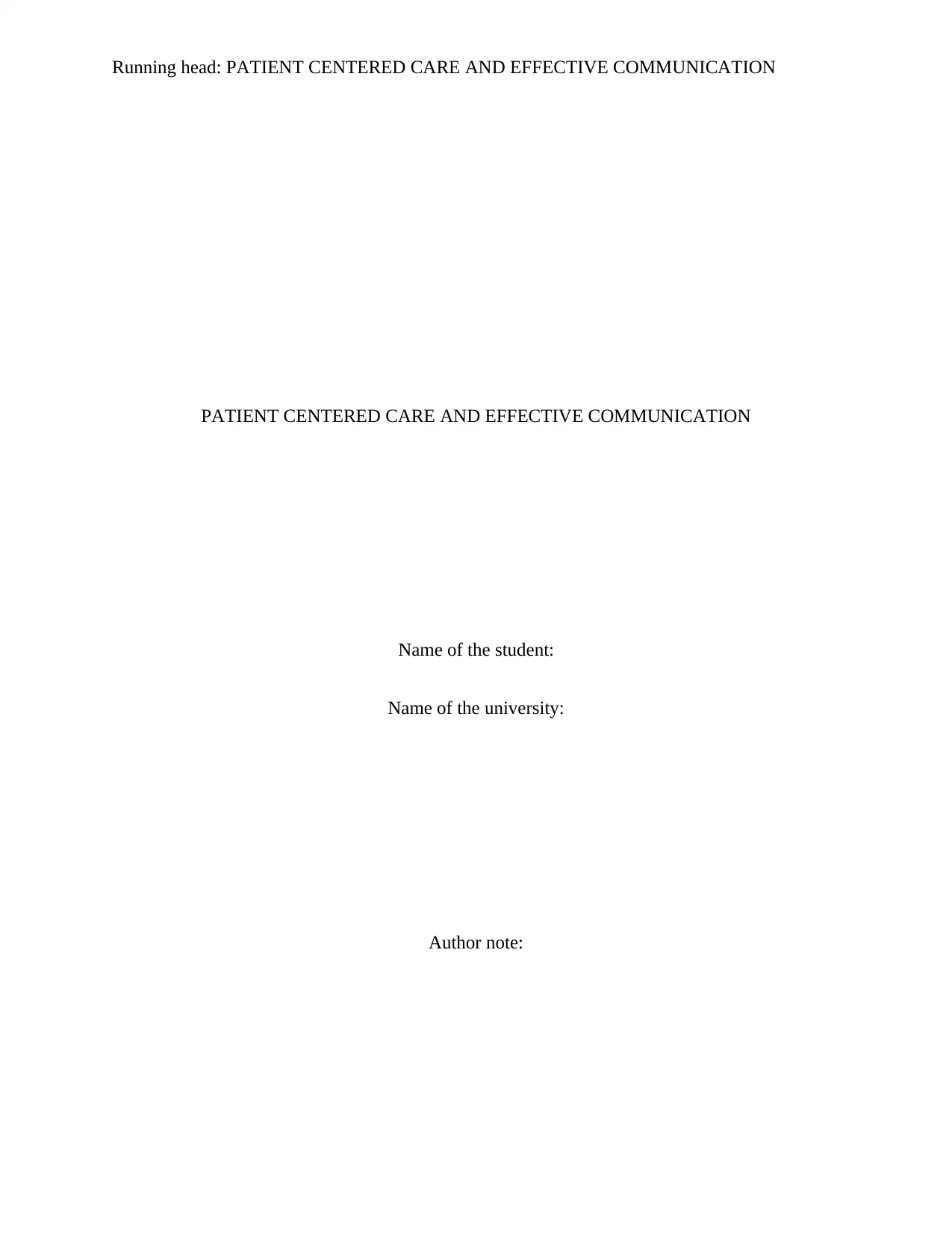
Running head: PATIENT CENTERED CARE AND EFFECTIVE COMMUNICATION
PATIENT CENTERED CARE AND EFFECTIVE COMMUNICATION
Name of the student:
Name of the university:
Author note:
PATIENT CENTERED CARE AND EFFECTIVE COMMUNICATION
Name of the student:
Name of the university:
Author note:
Secure Best Marks with AI Grader
Need help grading? Try our AI Grader for instant feedback on your assignments.
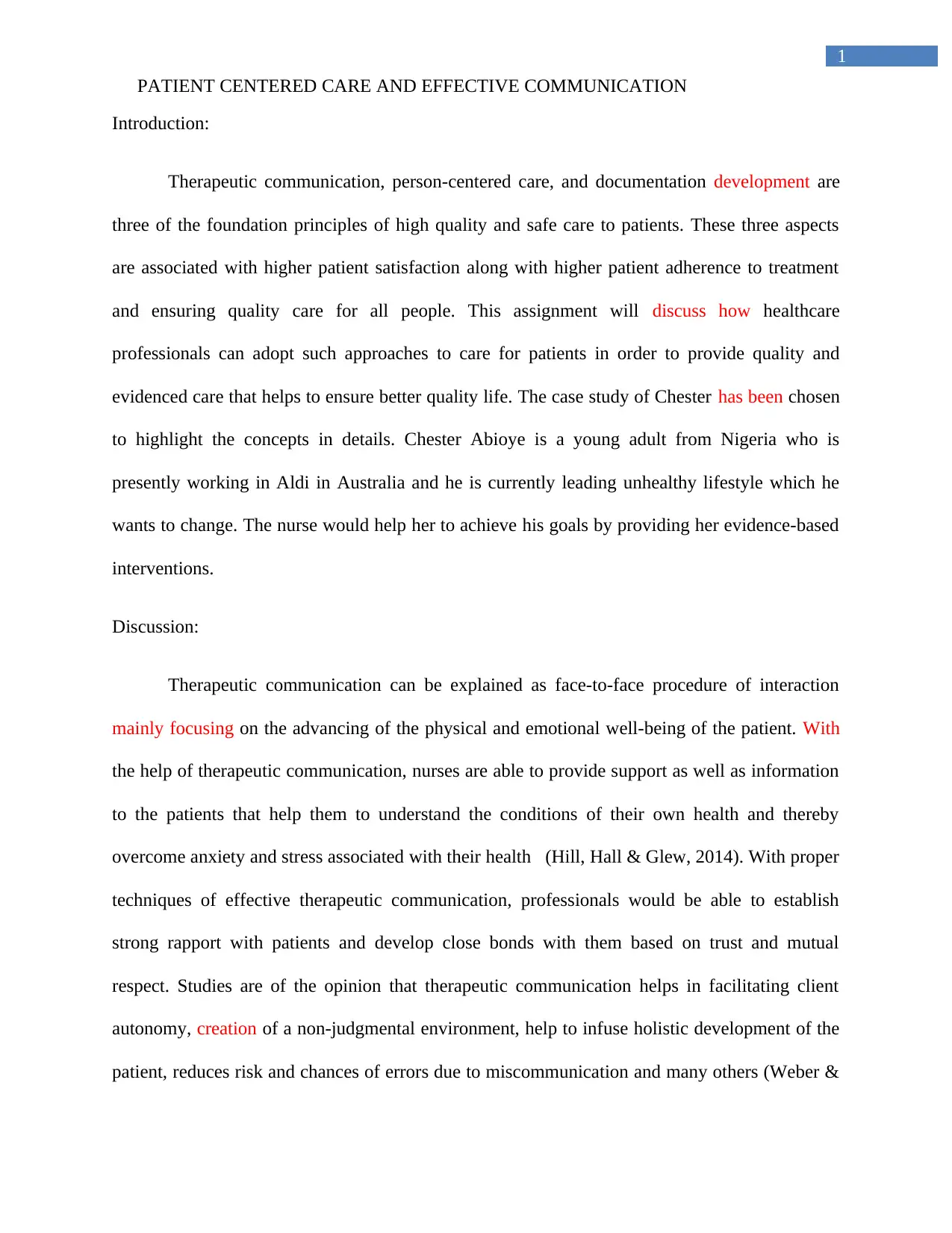
1
PATIENT CENTERED CARE AND EFFECTIVE COMMUNICATION
Introduction:
Therapeutic communication, person-centered care, and documentation development are
three of the foundation principles of high quality and safe care to patients. These three aspects
are associated with higher patient satisfaction along with higher patient adherence to treatment
and ensuring quality care for all people. This assignment will discuss how healthcare
professionals can adopt such approaches to care for patients in order to provide quality and
evidenced care that helps to ensure better quality life. The case study of Chester has been chosen
to highlight the concepts in details. Chester Abioye is a young adult from Nigeria who is
presently working in Aldi in Australia and he is currently leading unhealthy lifestyle which he
wants to change. The nurse would help her to achieve his goals by providing her evidence-based
interventions.
Discussion:
Therapeutic communication can be explained as face-to-face procedure of interaction
mainly focusing on the advancing of the physical and emotional well-being of the patient. With
the help of therapeutic communication, nurses are able to provide support as well as information
to the patients that help them to understand the conditions of their own health and thereby
overcome anxiety and stress associated with their health (Hill, Hall & Glew, 2014). With proper
techniques of effective therapeutic communication, professionals would be able to establish
strong rapport with patients and develop close bonds with them based on trust and mutual
respect. Studies are of the opinion that therapeutic communication helps in facilitating client
autonomy, creation of a non-judgmental environment, help to infuse holistic development of the
patient, reduces risk and chances of errors due to miscommunication and many others (Weber &
PATIENT CENTERED CARE AND EFFECTIVE COMMUNICATION
Introduction:
Therapeutic communication, person-centered care, and documentation development are
three of the foundation principles of high quality and safe care to patients. These three aspects
are associated with higher patient satisfaction along with higher patient adherence to treatment
and ensuring quality care for all people. This assignment will discuss how healthcare
professionals can adopt such approaches to care for patients in order to provide quality and
evidenced care that helps to ensure better quality life. The case study of Chester has been chosen
to highlight the concepts in details. Chester Abioye is a young adult from Nigeria who is
presently working in Aldi in Australia and he is currently leading unhealthy lifestyle which he
wants to change. The nurse would help her to achieve his goals by providing her evidence-based
interventions.
Discussion:
Therapeutic communication can be explained as face-to-face procedure of interaction
mainly focusing on the advancing of the physical and emotional well-being of the patient. With
the help of therapeutic communication, nurses are able to provide support as well as information
to the patients that help them to understand the conditions of their own health and thereby
overcome anxiety and stress associated with their health (Hill, Hall & Glew, 2014). With proper
techniques of effective therapeutic communication, professionals would be able to establish
strong rapport with patients and develop close bonds with them based on trust and mutual
respect. Studies are of the opinion that therapeutic communication helps in facilitating client
autonomy, creation of a non-judgmental environment, help to infuse holistic development of the
patient, reduces risk and chances of errors due to miscommunication and many others (Weber &
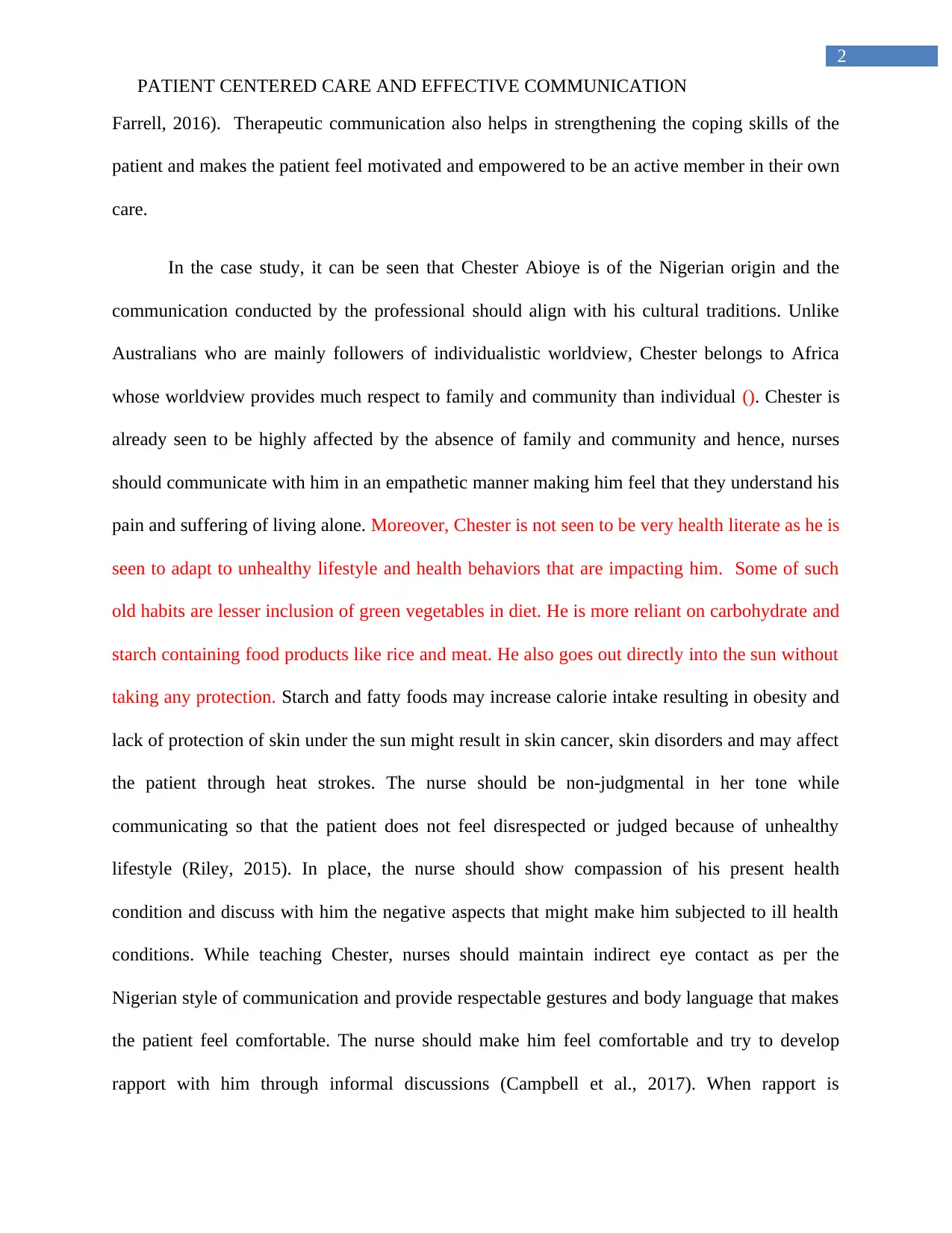
2
PATIENT CENTERED CARE AND EFFECTIVE COMMUNICATION
Farrell, 2016). Therapeutic communication also helps in strengthening the coping skills of the
patient and makes the patient feel motivated and empowered to be an active member in their own
care.
In the case study, it can be seen that Chester Abioye is of the Nigerian origin and the
communication conducted by the professional should align with his cultural traditions. Unlike
Australians who are mainly followers of individualistic worldview, Chester belongs to Africa
whose worldview provides much respect to family and community than individual (). Chester is
already seen to be highly affected by the absence of family and community and hence, nurses
should communicate with him in an empathetic manner making him feel that they understand his
pain and suffering of living alone. Moreover, Chester is not seen to be very health literate as he is
seen to adapt to unhealthy lifestyle and health behaviors that are impacting him. Some of such
old habits are lesser inclusion of green vegetables in diet. He is more reliant on carbohydrate and
starch containing food products like rice and meat. He also goes out directly into the sun without
taking any protection. Starch and fatty foods may increase calorie intake resulting in obesity and
lack of protection of skin under the sun might result in skin cancer, skin disorders and may affect
the patient through heat strokes. The nurse should be non-judgmental in her tone while
communicating so that the patient does not feel disrespected or judged because of unhealthy
lifestyle (Riley, 2015). In place, the nurse should show compassion of his present health
condition and discuss with him the negative aspects that might make him subjected to ill health
conditions. While teaching Chester, nurses should maintain indirect eye contact as per the
Nigerian style of communication and provide respectable gestures and body language that makes
the patient feel comfortable. The nurse should make him feel comfortable and try to develop
rapport with him through informal discussions (Campbell et al., 2017). When rapport is
PATIENT CENTERED CARE AND EFFECTIVE COMMUNICATION
Farrell, 2016). Therapeutic communication also helps in strengthening the coping skills of the
patient and makes the patient feel motivated and empowered to be an active member in their own
care.
In the case study, it can be seen that Chester Abioye is of the Nigerian origin and the
communication conducted by the professional should align with his cultural traditions. Unlike
Australians who are mainly followers of individualistic worldview, Chester belongs to Africa
whose worldview provides much respect to family and community than individual (). Chester is
already seen to be highly affected by the absence of family and community and hence, nurses
should communicate with him in an empathetic manner making him feel that they understand his
pain and suffering of living alone. Moreover, Chester is not seen to be very health literate as he is
seen to adapt to unhealthy lifestyle and health behaviors that are impacting him. Some of such
old habits are lesser inclusion of green vegetables in diet. He is more reliant on carbohydrate and
starch containing food products like rice and meat. He also goes out directly into the sun without
taking any protection. Starch and fatty foods may increase calorie intake resulting in obesity and
lack of protection of skin under the sun might result in skin cancer, skin disorders and may affect
the patient through heat strokes. The nurse should be non-judgmental in her tone while
communicating so that the patient does not feel disrespected or judged because of unhealthy
lifestyle (Riley, 2015). In place, the nurse should show compassion of his present health
condition and discuss with him the negative aspects that might make him subjected to ill health
conditions. While teaching Chester, nurses should maintain indirect eye contact as per the
Nigerian style of communication and provide respectable gestures and body language that makes
the patient feel comfortable. The nurse should make him feel comfortable and try to develop
rapport with him through informal discussions (Campbell et al., 2017). When rapport is
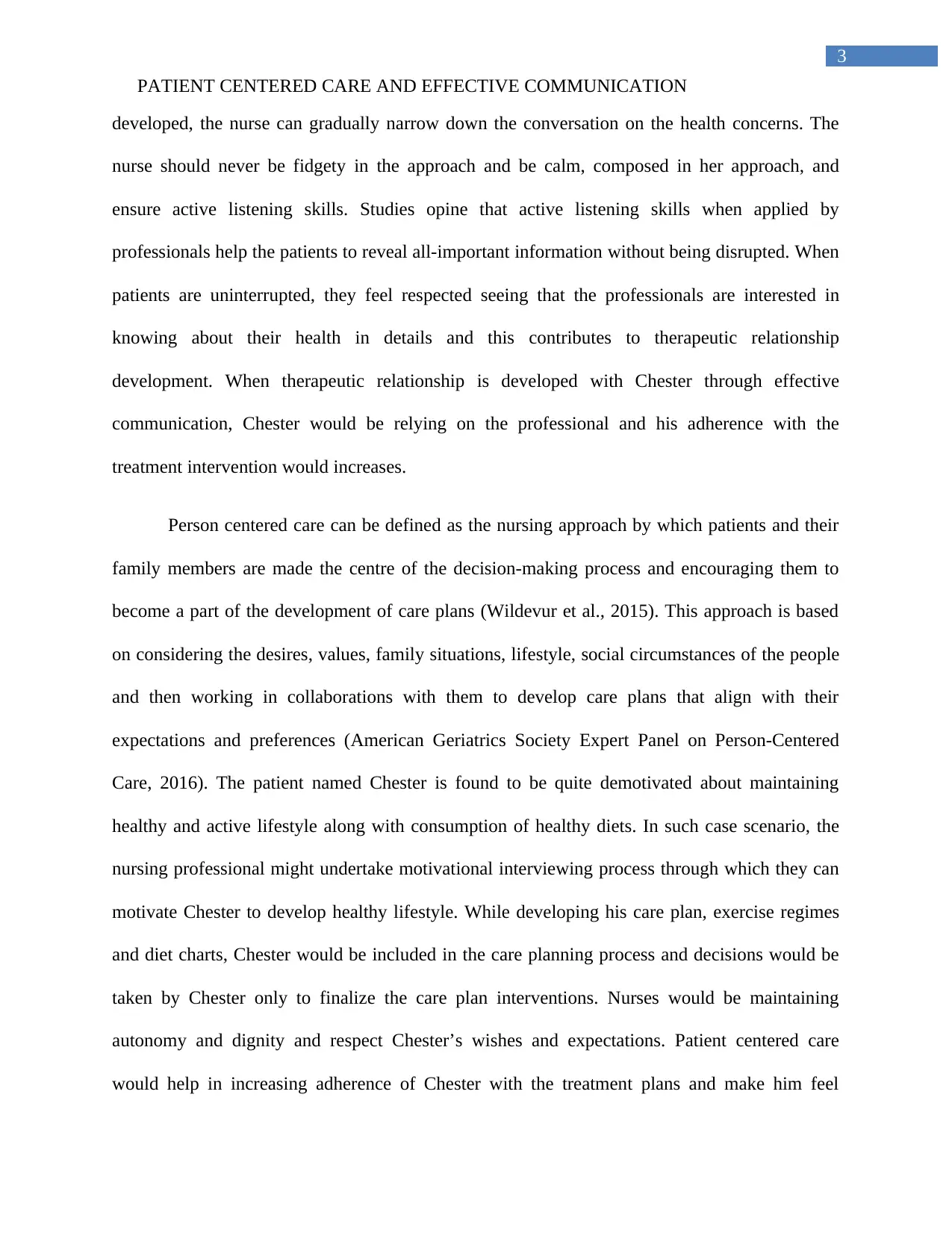
3
PATIENT CENTERED CARE AND EFFECTIVE COMMUNICATION
developed, the nurse can gradually narrow down the conversation on the health concerns. The
nurse should never be fidgety in the approach and be calm, composed in her approach, and
ensure active listening skills. Studies opine that active listening skills when applied by
professionals help the patients to reveal all-important information without being disrupted. When
patients are uninterrupted, they feel respected seeing that the professionals are interested in
knowing about their health in details and this contributes to therapeutic relationship
development. When therapeutic relationship is developed with Chester through effective
communication, Chester would be relying on the professional and his adherence with the
treatment intervention would increases.
Person centered care can be defined as the nursing approach by which patients and their
family members are made the centre of the decision-making process and encouraging them to
become a part of the development of care plans (Wildevur et al., 2015). This approach is based
on considering the desires, values, family situations, lifestyle, social circumstances of the people
and then working in collaborations with them to develop care plans that align with their
expectations and preferences (American Geriatrics Society Expert Panel on Person-Centered
Care, 2016). The patient named Chester is found to be quite demotivated about maintaining
healthy and active lifestyle along with consumption of healthy diets. In such case scenario, the
nursing professional might undertake motivational interviewing process through which they can
motivate Chester to develop healthy lifestyle. While developing his care plan, exercise regimes
and diet charts, Chester would be included in the care planning process and decisions would be
taken by Chester only to finalize the care plan interventions. Nurses would be maintaining
autonomy and dignity and respect Chester’s wishes and expectations. Patient centered care
would help in increasing adherence of Chester with the treatment plans and make him feel
PATIENT CENTERED CARE AND EFFECTIVE COMMUNICATION
developed, the nurse can gradually narrow down the conversation on the health concerns. The
nurse should never be fidgety in the approach and be calm, composed in her approach, and
ensure active listening skills. Studies opine that active listening skills when applied by
professionals help the patients to reveal all-important information without being disrupted. When
patients are uninterrupted, they feel respected seeing that the professionals are interested in
knowing about their health in details and this contributes to therapeutic relationship
development. When therapeutic relationship is developed with Chester through effective
communication, Chester would be relying on the professional and his adherence with the
treatment intervention would increases.
Person centered care can be defined as the nursing approach by which patients and their
family members are made the centre of the decision-making process and encouraging them to
become a part of the development of care plans (Wildevur et al., 2015). This approach is based
on considering the desires, values, family situations, lifestyle, social circumstances of the people
and then working in collaborations with them to develop care plans that align with their
expectations and preferences (American Geriatrics Society Expert Panel on Person-Centered
Care, 2016). The patient named Chester is found to be quite demotivated about maintaining
healthy and active lifestyle along with consumption of healthy diets. In such case scenario, the
nursing professional might undertake motivational interviewing process through which they can
motivate Chester to develop healthy lifestyle. While developing his care plan, exercise regimes
and diet charts, Chester would be included in the care planning process and decisions would be
taken by Chester only to finalize the care plan interventions. Nurses would be maintaining
autonomy and dignity and respect Chester’s wishes and expectations. Patient centered care
would help in increasing adherence of Chester with the treatment plans and make him feel
Secure Best Marks with AI Grader
Need help grading? Try our AI Grader for instant feedback on your assignments.
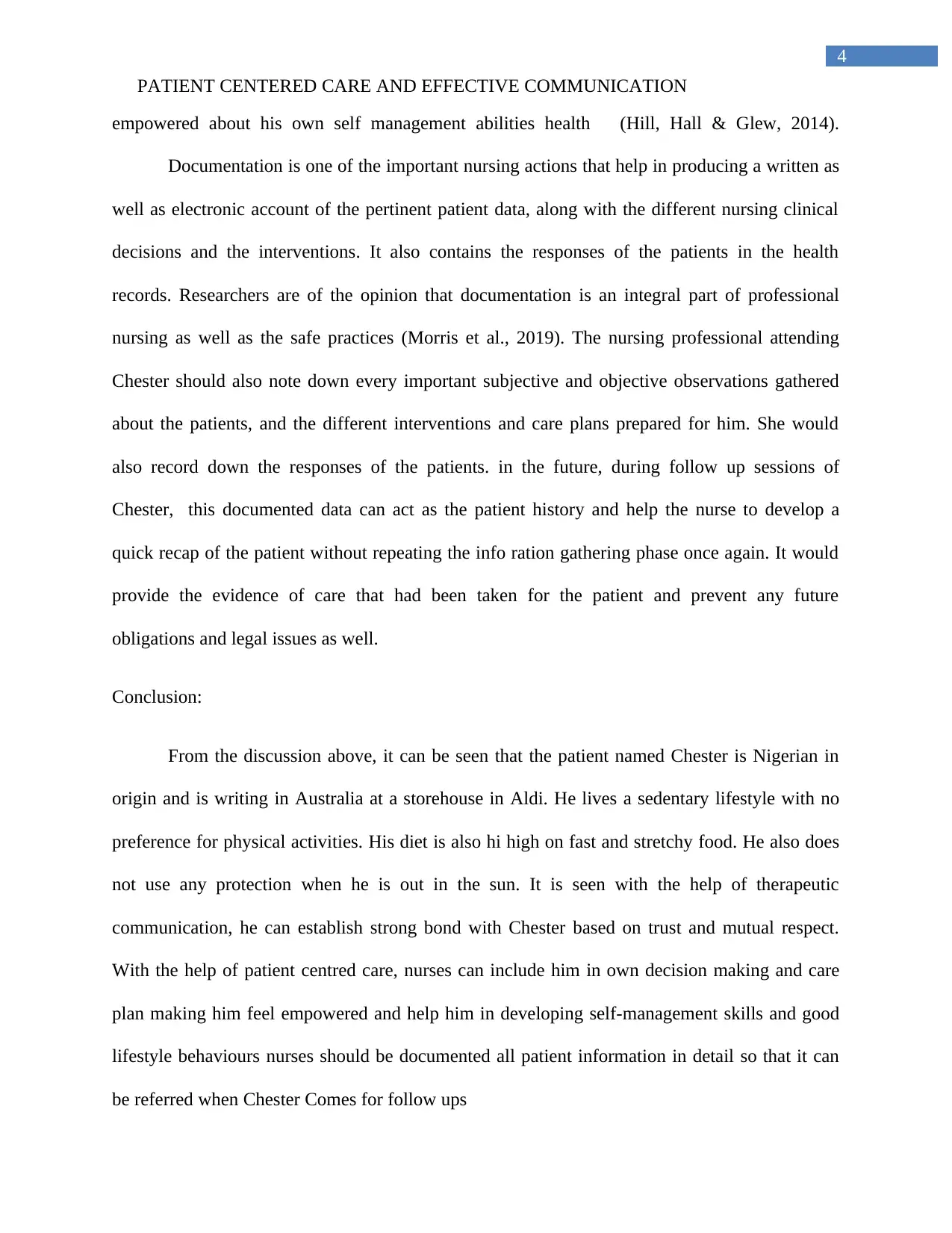
4
PATIENT CENTERED CARE AND EFFECTIVE COMMUNICATION
empowered about his own self management abilities health (Hill, Hall & Glew, 2014).
Documentation is one of the important nursing actions that help in producing a written as
well as electronic account of the pertinent patient data, along with the different nursing clinical
decisions and the interventions. It also contains the responses of the patients in the health
records. Researchers are of the opinion that documentation is an integral part of professional
nursing as well as the safe practices (Morris et al., 2019). The nursing professional attending
Chester should also note down every important subjective and objective observations gathered
about the patients, and the different interventions and care plans prepared for him. She would
also record down the responses of the patients. in the future, during follow up sessions of
Chester, this documented data can act as the patient history and help the nurse to develop a
quick recap of the patient without repeating the info ration gathering phase once again. It would
provide the evidence of care that had been taken for the patient and prevent any future
obligations and legal issues as well.
Conclusion:
From the discussion above, it can be seen that the patient named Chester is Nigerian in
origin and is writing in Australia at a storehouse in Aldi. He lives a sedentary lifestyle with no
preference for physical activities. His diet is also hi high on fast and stretchy food. He also does
not use any protection when he is out in the sun. It is seen with the help of therapeutic
communication, he can establish strong bond with Chester based on trust and mutual respect.
With the help of patient centred care, nurses can include him in own decision making and care
plan making him feel empowered and help him in developing self-management skills and good
lifestyle behaviours nurses should be documented all patient information in detail so that it can
be referred when Chester Comes for follow ups
PATIENT CENTERED CARE AND EFFECTIVE COMMUNICATION
empowered about his own self management abilities health (Hill, Hall & Glew, 2014).
Documentation is one of the important nursing actions that help in producing a written as
well as electronic account of the pertinent patient data, along with the different nursing clinical
decisions and the interventions. It also contains the responses of the patients in the health
records. Researchers are of the opinion that documentation is an integral part of professional
nursing as well as the safe practices (Morris et al., 2019). The nursing professional attending
Chester should also note down every important subjective and objective observations gathered
about the patients, and the different interventions and care plans prepared for him. She would
also record down the responses of the patients. in the future, during follow up sessions of
Chester, this documented data can act as the patient history and help the nurse to develop a
quick recap of the patient without repeating the info ration gathering phase once again. It would
provide the evidence of care that had been taken for the patient and prevent any future
obligations and legal issues as well.
Conclusion:
From the discussion above, it can be seen that the patient named Chester is Nigerian in
origin and is writing in Australia at a storehouse in Aldi. He lives a sedentary lifestyle with no
preference for physical activities. His diet is also hi high on fast and stretchy food. He also does
not use any protection when he is out in the sun. It is seen with the help of therapeutic
communication, he can establish strong bond with Chester based on trust and mutual respect.
With the help of patient centred care, nurses can include him in own decision making and care
plan making him feel empowered and help him in developing self-management skills and good
lifestyle behaviours nurses should be documented all patient information in detail so that it can
be referred when Chester Comes for follow ups
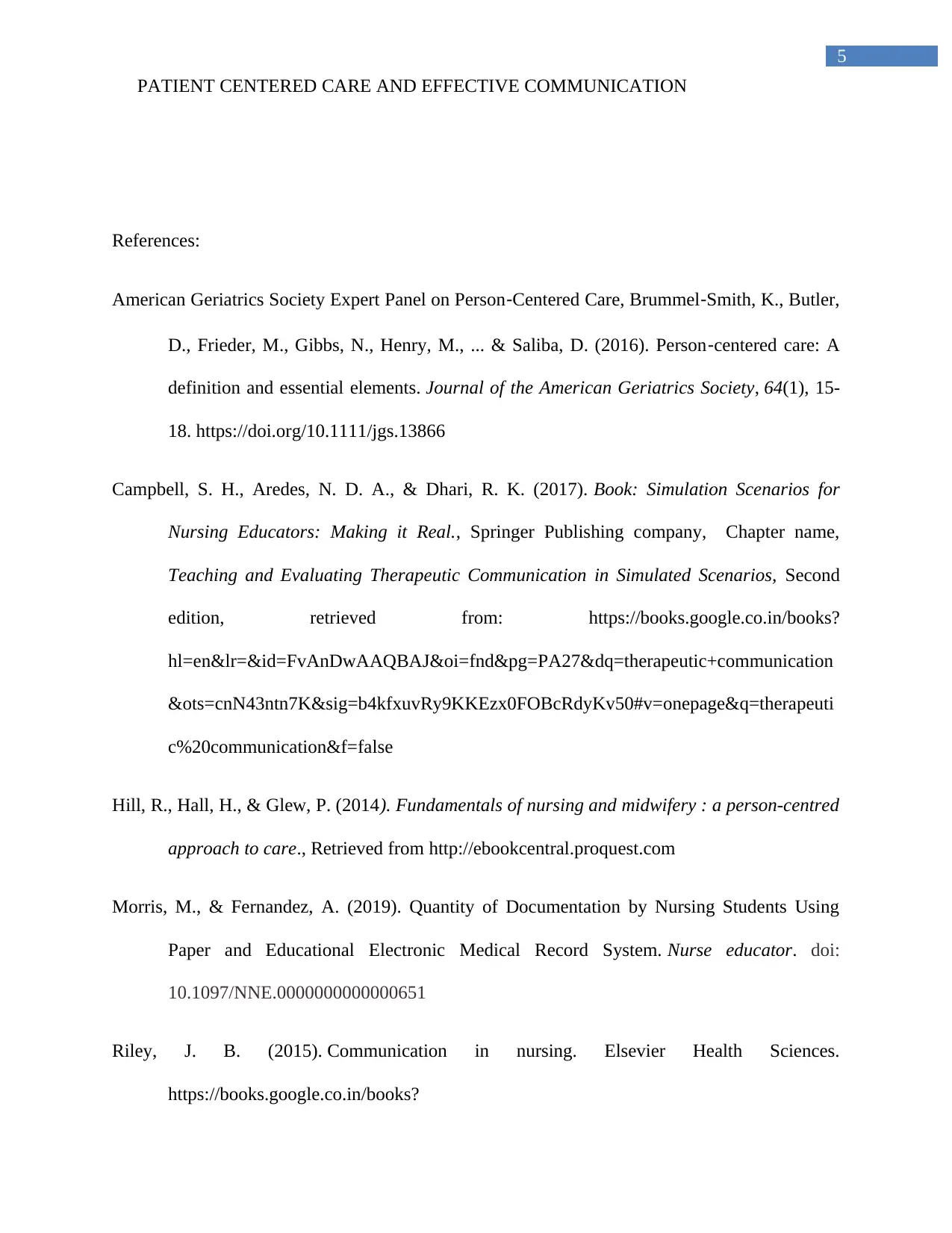
5
PATIENT CENTERED CARE AND EFFECTIVE COMMUNICATION
References:
American Geriatrics Society Expert Panel on Person‐Centered Care, Brummel‐Smith, K., Butler,
D., Frieder, M., Gibbs, N., Henry, M., ... & Saliba, D. (2016). Person‐centered care: A
definition and essential elements. Journal of the American Geriatrics Society, 64(1), 15-
18. https://doi.org/10.1111/jgs.13866
Campbell, S. H., Aredes, N. D. A., & Dhari, R. K. (2017). Book: Simulation Scenarios for
Nursing Educators: Making it Real., Springer Publishing company, Chapter name,
Teaching and Evaluating Therapeutic Communication in Simulated Scenarios, Second
edition, retrieved from: https://books.google.co.in/books?
hl=en&lr=&id=FvAnDwAAQBAJ&oi=fnd&pg=PA27&dq=therapeutic+communication
&ots=cnN43ntn7K&sig=b4kfxuvRy9KKEzx0FOBcRdyKv50#v=onepage&q=therapeuti
c%20communication&f=false
Hill, R., Hall, H., & Glew, P. (2014). Fundamentals of nursing and midwifery : a person-centred
approach to care., Retrieved from http://ebookcentral.proquest.com
Morris, M., & Fernandez, A. (2019). Quantity of Documentation by Nursing Students Using
Paper and Educational Electronic Medical Record System. Nurse educator. doi:
10.1097/NNE.0000000000000651
Riley, J. B. (2015). Communication in nursing. Elsevier Health Sciences.
https://books.google.co.in/books?
PATIENT CENTERED CARE AND EFFECTIVE COMMUNICATION
References:
American Geriatrics Society Expert Panel on Person‐Centered Care, Brummel‐Smith, K., Butler,
D., Frieder, M., Gibbs, N., Henry, M., ... & Saliba, D. (2016). Person‐centered care: A
definition and essential elements. Journal of the American Geriatrics Society, 64(1), 15-
18. https://doi.org/10.1111/jgs.13866
Campbell, S. H., Aredes, N. D. A., & Dhari, R. K. (2017). Book: Simulation Scenarios for
Nursing Educators: Making it Real., Springer Publishing company, Chapter name,
Teaching and Evaluating Therapeutic Communication in Simulated Scenarios, Second
edition, retrieved from: https://books.google.co.in/books?
hl=en&lr=&id=FvAnDwAAQBAJ&oi=fnd&pg=PA27&dq=therapeutic+communication
&ots=cnN43ntn7K&sig=b4kfxuvRy9KKEzx0FOBcRdyKv50#v=onepage&q=therapeuti
c%20communication&f=false
Hill, R., Hall, H., & Glew, P. (2014). Fundamentals of nursing and midwifery : a person-centred
approach to care., Retrieved from http://ebookcentral.proquest.com
Morris, M., & Fernandez, A. (2019). Quantity of Documentation by Nursing Students Using
Paper and Educational Electronic Medical Record System. Nurse educator. doi:
10.1097/NNE.0000000000000651
Riley, J. B. (2015). Communication in nursing. Elsevier Health Sciences.
https://books.google.co.in/books?
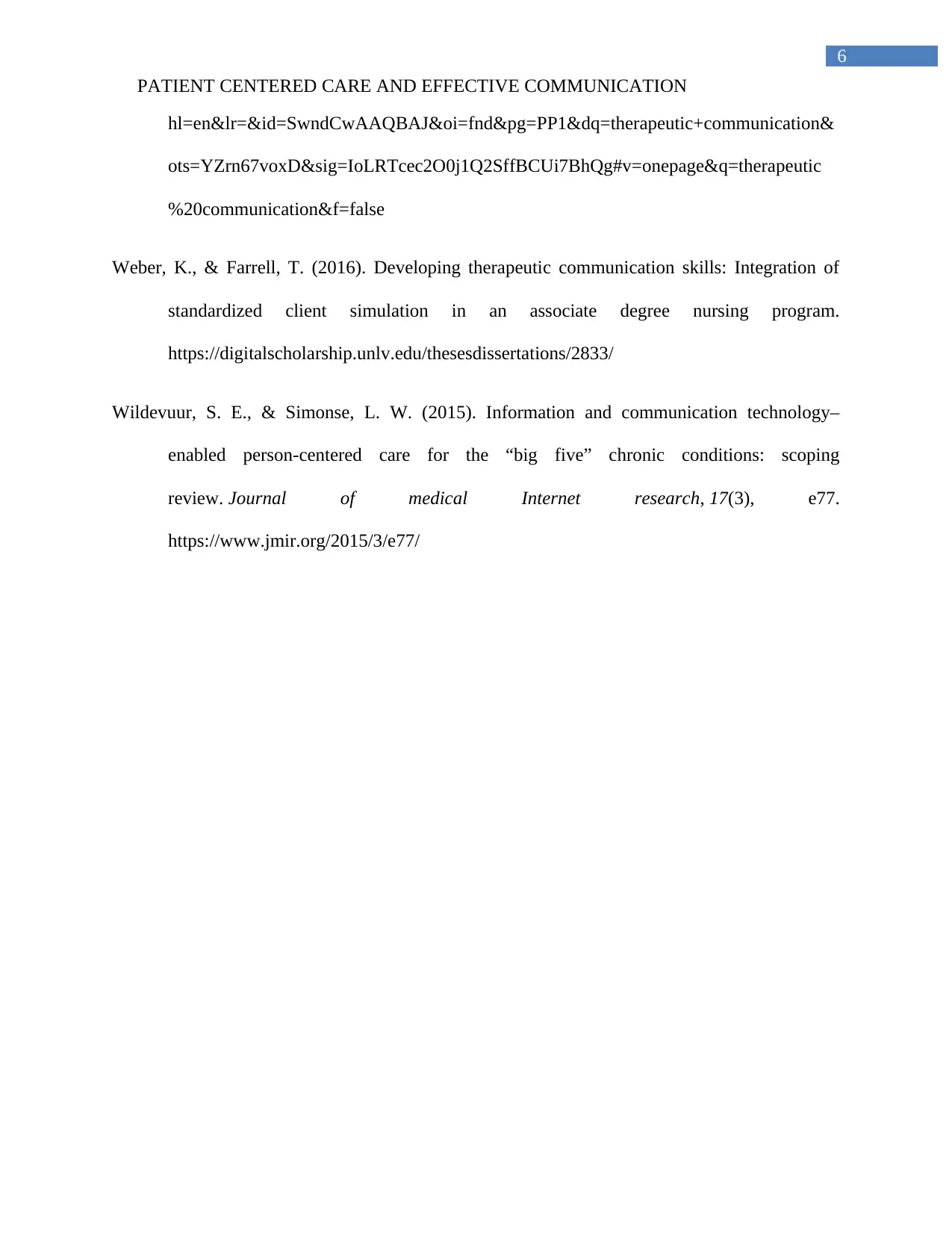
6
PATIENT CENTERED CARE AND EFFECTIVE COMMUNICATION
hl=en&lr=&id=SwndCwAAQBAJ&oi=fnd&pg=PP1&dq=therapeutic+communication&
ots=YZrn67voxD&sig=IoLRTcec2O0j1Q2SffBCUi7BhQg#v=onepage&q=therapeutic
%20communication&f=false
Weber, K., & Farrell, T. (2016). Developing therapeutic communication skills: Integration of
standardized client simulation in an associate degree nursing program.
https://digitalscholarship.unlv.edu/thesesdissertations/2833/
Wildevuur, S. E., & Simonse, L. W. (2015). Information and communication technology–
enabled person-centered care for the “big five” chronic conditions: scoping
review. Journal of medical Internet research, 17(3), e77.
https://www.jmir.org/2015/3/e77/
PATIENT CENTERED CARE AND EFFECTIVE COMMUNICATION
hl=en&lr=&id=SwndCwAAQBAJ&oi=fnd&pg=PP1&dq=therapeutic+communication&
ots=YZrn67voxD&sig=IoLRTcec2O0j1Q2SffBCUi7BhQg#v=onepage&q=therapeutic
%20communication&f=false
Weber, K., & Farrell, T. (2016). Developing therapeutic communication skills: Integration of
standardized client simulation in an associate degree nursing program.
https://digitalscholarship.unlv.edu/thesesdissertations/2833/
Wildevuur, S. E., & Simonse, L. W. (2015). Information and communication technology–
enabled person-centered care for the “big five” chronic conditions: scoping
review. Journal of medical Internet research, 17(3), e77.
https://www.jmir.org/2015/3/e77/
1 out of 7
Related Documents
Your All-in-One AI-Powered Toolkit for Academic Success.
+13062052269
info@desklib.com
Available 24*7 on WhatsApp / Email
![[object Object]](/_next/static/media/star-bottom.7253800d.svg)
Unlock your academic potential
© 2024 | Zucol Services PVT LTD | All rights reserved.





